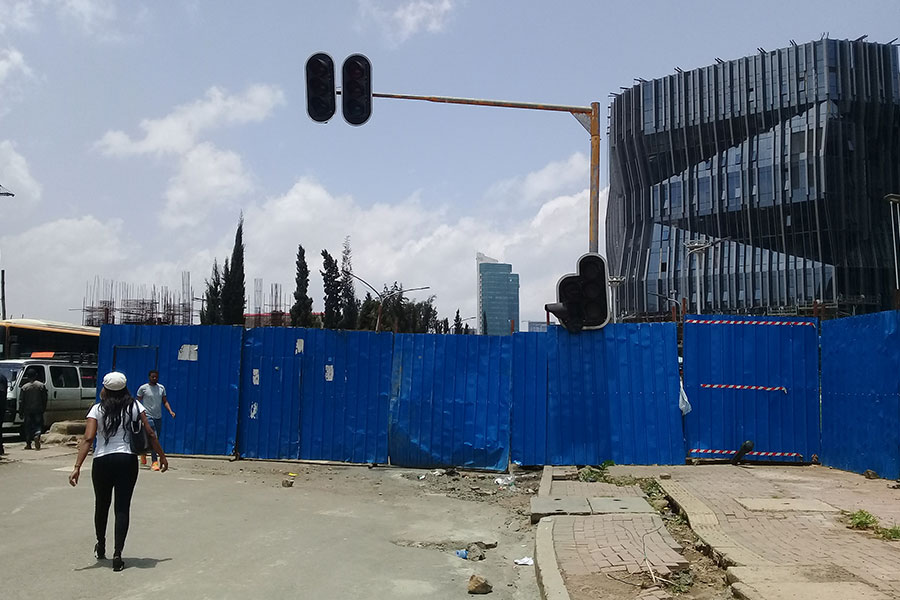
Radar | Aug 21,2021
Ethio telecom's mobile money service, Telebirr, has managed to sign up over half a million users in the four days since it was launched last week.
This represents a fifth of subscribers registered under the Commercial Bank of Ethiopia's "CBE Birr" service, revealing how the banking industry will see its daunting competition to mobilise resources comes not from its traditional sector but from a mushrooming fin-tech lot. It heralds the convergence of finance and technology, disrupting the traditional way of doing banking.
At the helm of this disruption sits a smiley and cheerful Frehiwot Tamiru, CEO of the state-owned telecom monopoly.
Young, ambitious, smart and daring, Frehiwot appears to enjoy the full confidence of Prime Minister Abiy Ahmed (PhD), who graced with his presence the lavish launching ceremony she hosted last week. In attendance were high profile figures, including Finance Minister Ahmed Shide, his deputy Eyob Tekalign(PhD), and Girma Birru, an old hand advising the Prime Minister on the macroeconomic management. Their presence sends an unambiguous message to where the administration's heart lies in the battle yet to be fought between technology firms and legacy banks in seeking the purses of citizens in one of the most unbanked countries on earth.
In more ways than one, Frehiwot is an outlier in this battle. The first female to run the telecom monopoly in over 100 years, she had started with the Internet Network Security Agency (INSA), a cyber eavesdropping agency whose formation is credited to Prime Minister Abiy. He had served as its deputy director during the Agency's formative years before he left. Frehiwot too left the Agency to join the Ethiopian Telecommunication Corporation (ETC) where she was promoted to the rank of deputy CEO for Internal Support Services.
A graduate of Addis Abeba University in information technology, and postgraduate studies in business administration from the UK-based Open University, Frehiwot left the Corporation to run her own business, Doxa IT Technology Plc, a company she created to supply IT services and provide solutions.
Three months following the rise of Abiy to the top executive position of the government, he brought her back to Ethio telecom, the largest mobile operator in Africa with over 20,000 employees, replacing Andualem Admassie (PhD) as the CEO. Her tribulation remains to stir the company clear through the changing environment where not only the telecom sector is up for liberalisation, but the company itself is slated for partial privatisation. Consulting firms are hired to carry our country`s oldest company's valuation and develop its strategic path for survival under a changing and dynamic market environment.
With the expected entry of two foreign firms in the industry, Ethio telecom is slated to relegate the monopoly status it has been enjoying for over a century. Frehiwot wants to consolidate as much market position as she can, pushing the administration to let Ethio telecom hold onto the ownership of mobile terminals. Keeping the mobile money from the reach of foreign firms were some of her triumphs in retaining a competitive edge for Ethio telecom.
In the words of Prime Minister Abiy, such was a policy move his administration took but led the country lose half a billion dollars. He was referring to disappointing offers from firms bidding to obtain telecom licenses due to restrictions placed on foreign firms. Contrary to the high expectations, only two bidders - the MTN Group and a consortium led by Vodafone - have submitted bids for the two full telecom licenses being availed to foreign operators.
The Prime Minister has pledged to open the mobile money industry to foreign investors in a year.
The competitive edge Ethio telecom enjoys cuts far beyond those in the telecom sector.
Telebirr is designed to allow integration between bank accounts. The state-owned Commercial Bank of Ethiopia (CBE) is left with little choice but to develop interoperability with Telebirr and its core banking. The CBE is also the designated trust-account holder for Ethio telecom, where the firm deposits the equivalent of the total amount available on the mobile money system, a decision that private banks are displeased with.
Interested in integrating their services with Telebirr, private banks want to get the opportunity to open trust accounts.
"If equal opportunities are provided, every bank will strive to benefit for its own lot," says Deribe Asfaw, president of the Cooperative Bank of Oromia (CBO), who believes that Telebirr will contribute a great deal to expanding the digital economy.
Contracted to Huawei, a Chinese technology infrastructure provider, for close to five million dollars, Ethio telecom released Telebirr in five months. A two-year task completed in a quarter of the time, as Frehiwot put it during the launching. Developing the mobile money platform was put on steroids after the Council of Ministers passed a regulation allowing the state telecom operator to engage in digital financial services, with a beefed-up capital 10 times larger to 400 billion Br.
Frehiwot's drive in repositioning Ethio telecom as a fintech company is nowhere more evident than in the journey she took launching Telebirr. From approving the blessing of the regulatory authorities at the central bank to selecting a platform developer and organising a project office, the launch took less than half a year. However, industry insiders believe this could be achieved.
"Five months might seem like a rushed process in Ethiopia, but considering the trend in the global development of technology-based telecom infrastructures, the ending pitch is acceptable," according to a senior manager working at EthSwitch.
Frehiwot will find her determination to make breakeven on the investment Ethio telecom has made in half the time of the industry average of three and a half years an uphill task. Her ambition is to mobilise a 22 million customer base in just a year to achieve her goals.
Despite her enthusiasm, however, experts caution doing it will be far from easy.
One of the challenges in digital financial services is the costly task of customer acquisition, which has a direct impact on return on investment, says the senior manager at EthSwitch, an industry-wide payment clearing system incorporated by all banks in the industry as shareholders, including the National Bank of Ethiopia (NBE).
Frehiwot sees a competitive advantage for Ethio telecom in low cost during customer acquisition. Unlike other mobile money operators, it is easy for Ethio telecom to use its 285,000 distribution centres, serving 52.8 million mobile voice subscribers and 24 million internet users. An additional 1,500 centres dedicated to Telebirr services are in the making.
For the nascent fintech industry where small companies are emerging, Ethio telecom may pose an existential threat. It is too gigantic to the size and goodwill of any of the other mobile services providers.
Nebiat Tekle, a digital banking expert with over a decade of experience, sees this threat to others with Ethio telecom's move in creating a monopoly that is bound to affect existing local operators.
"Ethio telecom is too big to compete with for the local companies," said Nebiat.
But some see it coming with its opportunities.
Eyerusalem Hadgu is one of the industry insiders who foresee the positive attributes in competition. Working as head of public relations at MOSS ICT Consultancy, operators of M-Birr, Eyerusalem believes the introduction of new services creates competition and pushes existing companies to innovate and remain above the water.
"It'll bring business intelligence," she said. "This will in turn benefit users as more elevated, and less costly services are availed."
M-birr, one of the pioneers in the local mobile money industry, has 1.9 million customers and 19,000 agents in its cross-country network.
"We know what works in the market and what doesn't," said Eyerusalem. "We have better adaptability."
The mobile money industry has been growing slowly over the past few years as technology penetration increases, financial awareness grows, and the government started implementing pro-digital-economy strategies. There is still a long way to go, however, as smartphone penetration stands at 44pc amongst Ethio telecom users, while financial inclusion remains below 35pc, according to data from the World Bank.
Nonetheless, the launching of Telebirr is a few years overdue, said Prime Minister Abiy last week.
Free from major competition, for now, Telebirr is offering services such as transfers to and from linked bank accounts, person-to-person and bulk transfers, as well as the receipt of international remittance, free of charge. International remittance with Telebirr is availed through agreements between Ethio telecom and international transfer operators such as WorldRemit and Western Union. It will also make use of the GSMA facility, an initiative launched by a group of international mobile operators to make remittance affordable.
Ordinarily, service charges for remittance amount to eight percent to 12pc of the transactions made, and among the facility's sustainable development goals is a plan to reduce service fees to three percent. The international remittance service kicked off by Telebirr is useful in lowering commission fees, and it will also reduce indirect costs for receivers of remittance who would have to travel to find a bank branch, says Nebiat.
Transactions and withdrawals above 50 Br are subject to service fee charges ranging from two Birr to eight Birr.
Nebiat voiced his concern that this might be a difficult proposition, especially for those residing in remote areas.
"Regional adjustments might be needed," he said.
Frehiwot has shown over the past three years that cruising the Ethio telecom vessel in the uncharted waters, adjusting to the weather and high waves has been her forte.
PUBLISHED ON
May 15,2021 [ VOL
22 , NO
1098]

Fortune News | Jul 03,2021

Featured | Sep 04,2021

Fortune News | Sep 18,2021

Verbatim | Dec 19,2021

Fortune News | May 08,2021

Dec 22 , 2024 . By TIZITA SHEWAFERAW
Charged with transforming colossal state-owned enterprises into modern and competitiv...

Aug 18 , 2024 . By AKSAH ITALO
Although predictable Yonas Zerihun's job in the ride-hailing service is not immune to...

Jul 28 , 2024 . By TIZITA SHEWAFERAW
Unhabitual, perhaps too many, Samuel Gebreyohannes, 38, used to occasionally enjoy a couple of beers at breakfast. However, he recently swit...

Jul 13 , 2024 . By AKSAH ITALO
Investors who rely on tractors, trucks, and field vehicles for commuting, transporting commodities, and f...

Nov 1 , 2025
The National Bank of Ethiopia (NBE) issued a statement two weeks ago that appeared to...

Oct 25 , 2025
The regulatory machinery is on overdrive. In only two years, no fewer than 35 new pro...

Oct 18 , 2025
The political establishment, notably the ruling party and its top brass, has become p...

Oct 11 , 2025
Ladislas Farago, a roving Associated Press (AP) correspondent, arrived in Ethiopia in...